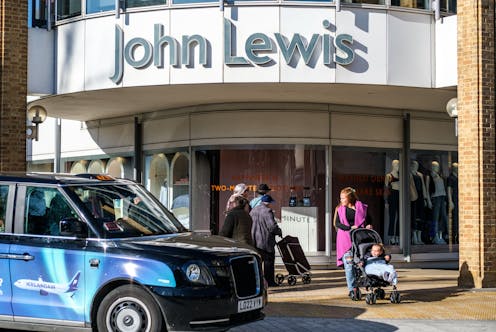
It was always a brave promise. But John Lewis’s pledge to be “never knowingly undersold” – that it wouldn’t be beaten on prices – lasted for almost a century until it was dropped by the British department store in 2022.
Now it’s back. And the company is hoping that those three familiar words will help boost its performance in a tough economic climate which has previously led to store closures and job cuts.
Commenting on the John Lewis Partnership’s latest results, which show that it halved its losses over the first six months of this year, CEO Nish Kankiwala claimed the recovery plan is working. And a key part of that continuing plan is the “never knowingly undersold” slogan, which officially reappeared on September 9, ahead of the most important three months in British retail running up to Christmas, the so-called “golden quarter”.
But will the price promise, which has long been an integral part of John Lewis’s brand identity and culture, bring customers through its doors, or persuade them to click on its website and app?
Certainly, the slogan has proved popular in the past, helping to build customer loyalty among shoppers who felt that John Lewis’s prices were fair. And for a long time the store relied almost exclusively on the phrase, which adorned shopping bags and signs, as an advertising strategy. (The company didn’t even have a marketing director until 2002.)
Competitive price matching was also popular with staff – who are “partners” rather than employees – as they were paid extra if they tracked down examples of stock being cheaper elsewhere.
But in 2022, for commercial reasons, John Lewis said the promise had to go. It mentioned online competition, stating that just 1% of its customers had made price match requests in 2021, and that it would instead be investing £500 million into lower prices.
It was a compelling argument. But the decision, along with recent store closures and speculation about changing the employee ownership model by selling part of the business, may have damaged the brand, and dented consumer confidence.
In a recent poll of 5,000 customers, three quarters agreed that a modernised version of the price promise would improve their perception of John Lewis.
And the reboot of the promise appears more workable now than when it was ditched two years ago. Until then, believe it or not, information about competitors’ prices was predominantly a manual process reliant on pencils, spreadsheets and visits to competitor stores.
It was difficult to be agile enough to respond to price fluctuations. The business just could not keep up. But the new iteration of the price promise will use AI to track and adjust pricing, making better use of the technology now available.
This is a savvy strategic move which will allow John Lewis to keep a close eye on the competition across the fashion, beauty, technology and home sectors – in real time. It will then match the prices of “thousands” of products from 25 specified retailers including e-commerce specialists AO.com and Amazon.
If customers can prove they could have bought a product for less at one of those retailers, they will be offered the difference within seven days of their purchase.
AI for agility
This use of AI is part of a reported £500 million investment into the business, particularly in technology, which happened during the tenure of the outgoing John Lewis chairman, Sharon White.
The business has benefited from comparable innovations in the past, with things like state-of-the-art warehousing and being the first major UK retailer to offer equal parental leave to all staff.
John Lewis is also well known for spending big money on turning Christmas TV advertising into a one of the most anticipated events of the festive period.
This year, that Christmas ad will be preceded by, a September marketing campaign under the tagline “Live Knowingly”, a nod to the slogan’s return.
Of course, whether any of this push works will be down to the customers and their willingness to shop at John Lewis. Shoppers are more discerning and have access to more information and choice than ever, so attempts to attract them will need to strike the right balance between aspiration and accessibility, especially when rising living costs are factored in.
And slogans are not a magic fix. Debenhams, which closed its doors for good in May 2021, once claimed to be “Britain’s favourite department store”.
So beyond the slogans and glossy ads, John Lewis will probably need to stay true to the retail philosophy of its founder John Spedan Lewis, who championed “value” and “assortment” – and who paved the way for the democratic ownership and customer-focused approach which has proved key to the business’s success.
Tamsin McLaren does not work for, consult, own shares in or receive funding from any company or organisation that would benefit from this article, and has disclosed no relevant affiliations beyond their academic appointment.
This article was originally published on The Conversation. Read the original article.







